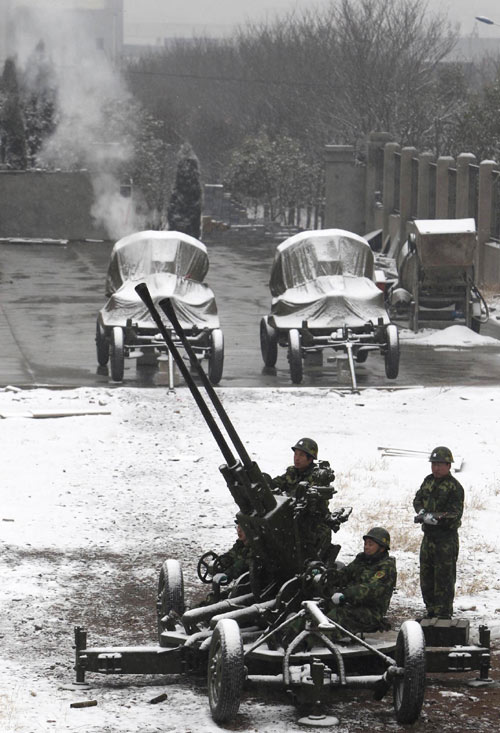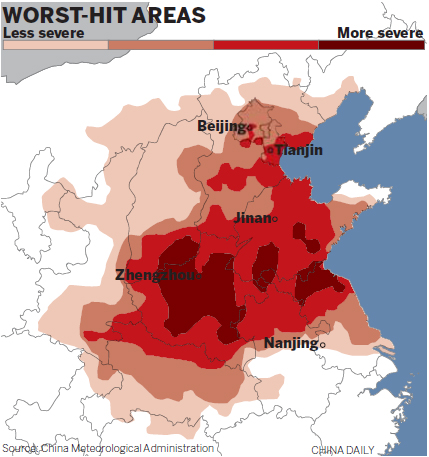Government and Policy
$1b to help battle worst drought in 60 years
By Jin Zhu (China Daily)
Updated: 2011-02-10 07:17
 |
Large Medium Small |
2.6 million people suffer shortages of drinking water
BEIJING - The government will spend $1 billion to battle the drought plaguing huge areas in the north, as wheat prices continued their climb and the UN warned of serious consequences for the winter harvest.
The drought is the worst in six decades in many areas, and has left a swathe of grain-producing regions reeling from a lack of any significant rainfall in more than three months.
The government will spend at least 6.7 billion yuan ($1.02 billion) to divert water to affected areas, construct emergency wells and irrigation facilities, and take other measures, the State Council, or the Cabinet, said in a statement on Wednesday after an executive meeting chaired by Premier Wen Jiabao.
The move was included in a 10-measure package to spur grain production and tackle the persisting drought, which poses a grave threat to wheat production.
|
 |
|
The meteorological department of Yichuan county in Luoyang, Henan province, conducts cloud seeding, by firing chemicals, to generate snow on Wednesday to alleviate the severe winter drought. [Zhang Xiaoli for China Daily] |
Wheat is generally grown in the north, while rice is primarily cultivated in the wetter south.
The State Council warned the situation could worsen, saying rainfall across northern China for the foreseeable future would remain "persistently below normal levels and major rivers will continue to be generally dry".
Some 2.57 million people and 2.79 million livestock are suffering from drinking water shortages, official figures showed.
The UN's Food and Agriculture Organization (FAO) also issued a warning on Tuesday over the impact on the winter wheat crop.
"The ongoing drought is potentially a very serious problem," the Rome-based agency said.
Eight major grain-producing provinces, including Shandong, Jiangsu, Henan, Hebei and Shanxi, have been affected. Together they produce more than 80 percent of China's winter wheat.
The situation in the regions could become critical if temperatures dropped further this month and a spring drought followed the winter one, the FAO said.
By Wednesday, a total of 7.8 million hectares of winter wheat had been affected by the drought in the eight provinces, accounting for 42.4 percent of their total wheat-sown area, according to the Ministry of Agriculture.

Concerns about the impact of the drought sent wheat prices on the Zhengzhou Commodity Exchange soaring nearly across the board on Wednesday.
Prices of a key contract had hit a "historic high" of 2,865 yuan per ton on Tuesday, the Chinese finance website Hexun reported, without specifying.
President Hu Jintao and Premier Wen paid separate visits to stricken areas last week and called for "all-out efforts" to fight the drought.
Footage from CCTV on Wednesday showed withered crops in parched farmland in Shandong, which could suffer its worst drought in 200 years.
Wheat prices in China have also been rising rapidly in the last few months. Average flour prices in the country rose more than 8 percent in January from the previous two months, the FAO said.
"China's grain situation is critical to the rest of the world - if they are forced to go out on the market to procure adequate supplies for their population, it could send huge shockwaves through the world's grain markets," the New York Times quoted Robert S. Zeigler, director- general of the International Rice Research Institute in Los Banos, the Philippines, as saying on Tuesday.
But Chinese agricultural experts believed it is still too early to predict a decrease in the country's wheat output.
"We can still expect a wheat harvest if these regions have sufficient rainfall next month," Lu Bu, a researcher at the Chinese Academy of Agricultural Sciences, told China Daily on Wednesday.
China Daily
(China Daily 02/10/2011 page1)